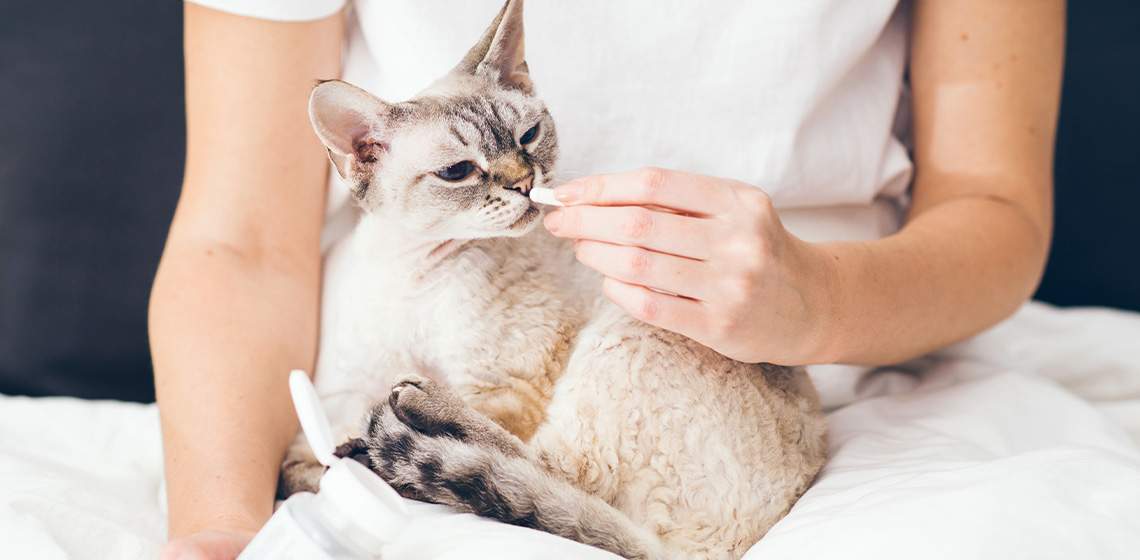Cat flu, sadly, is common. Lysine is a supplement that is sometimes used to treat the symptoms of cat flu and to try to prevent future symptoms, but does it work? Is it safe? Let’s take a look at the facts.
What is cat flu?
Cat flu is an upper respiratory tract infection that causes cold-like symptoms in cats. It is usually caused by the feline herpes virus or feline calicivirus, both of which are highly contagious. Let’s focus on the herpes virus, as lysine is typically used when the herpes virus is involved.
Symptoms of cat flu caused by the herpes virus include:
- Severe eye infections and discharge, known as conjunctivitis
- Eye ulceration: ulceration of the clear layer in front of the iris and pupil, called the cornea
- Sneezing and a discharge from the nose
- Lethargy (a lack of energy)
- Poor appetite
- Fever
- Coughing
It’s also common for cats with cat flu to develop a bacterial infection as well since the immune system is overwhelmed.
Once cats have the herpes virus, most become ‘carriers’. This means that, although they may not show any symptoms, they still have the virus in their body and may pass it on to other cats. It also means they may have a ‘flare-up’ of symptoms when they are run down or stressed.
Cat flu is an upper respiratory tract infection that causes cold-like symptoms in cats. It is usually caused by the feline herpes virus or feline calicivirus, both of which are highly contagious.
What is lysine?
Lysine is an amino acid, which is given by mouth as a dietary supplement. It is available in various forms, including a paste. It is sometimes used as part of a treatment plan for the feline herpes virus. It has been considered a natural remedy for some of the symptoms of cat flu, helping to reduce the symptoms and trying to prevent the symptoms from recurring.
Because lysine is a nutraceutical, it isn’t regulated in the same way as veterinary medicines. This means that the manufacturer does not have to prove the quality, or amount, of the active ingredient present. It also means they do not have to prove that it works. This means it’s best to only use a lysine preparation that has been recommended by your veterinarian.
Lysine has been considered a natural remedy for some of the symptoms of cat flu, helping to reduce the symptoms and trying to prevent the symptoms from recurring.
How does lysine work?
It is thought that lysine works by stopping the herpes virus from being able to replicate (multiply). Herpes virus needs arginine, another amino acid to replicate. It is thought that lysine lowers the levels of arginine and that low levels of arginine in the cells prevent the herpes virus from replicating.
Some older studies seemed to prove that giving lysine every day by mouth reduced the amount of virus that cats with herpes virus shed.
Whether lysine is actually beneficial is now under question. One well-known review of antiviral drugs (and other compounds) with activity against feline herpes virus found considerable variability among the studies they looked into. Simply put, this means the studies were designed in different ways and had different results. In other words, more research is needed! Especially in cats living with owners, rather than in shelters, for example.
The same review concludes that the studies suggest lysine is safe when given to cats by mouth and may reduce viral shedding in infected cats, and may reduce clinical signs in cats infected with the virus for the first time.
Another review of studies on the subject suggests that there is no scientific evidence that it works at all. However, there is some anecdotal evidence (for example owners saying that their cat goes downhill every time they stop lysine) that lysine can help cats with feline herpes virus.
Some older studies seemed to prove that giving lysine every day by mouth reduced the amount of virus that cats with herpes virus shed.
What are the side effects of lysine in cats?
Side effects don’t seem to be common, especially if lysine is given with some food. Humans have reported diarrhea and stomachache when taking lysine, so it’s possible that cats could experience this too. Other gut symptoms could include feeling or being sick. There have been a few reports of a skin reaction, such as itching, too.
Some people worry about using lysine, as one review states “Lowering arginine levels is highly undesirable since cats cannot synthesize” (make) “this amino acid themselves,”… “Arginine deficiency” (too little) “will result in hyperammonemia, which may be fatal.” However, most reviews conclude that lysine is generally considered safe. It’s a good idea to discuss any concerns you might have with your veterinarian.
Stopping lysine alongside treating the symptoms (if needed) should be enough to reverse any side effects in most cats.
Side effects don’t seem to be common, especially if lysine is given with some food.
What is the dose of lysine in cats?
The MSD veterinary manual suggests a dose of lysine of 250 mg by mouth, 2 to 3 times a day. However, it’s really important that you only dose your cat as instructed by your veterinarian. You should never give lysine, or any medicine or food supplement, to your cat without checking with your veterinarian first. This is especially important if your cat has a medical condition, or is on any medication.
Summary
- Lysine is an amino acid, given by mouth as a food supplement
- Lysine is sometimes used to reduce the symptoms of cat flu and to prevent future flare-ups
- Evidence to prove that lysine works is lacking, although there is some anecdotal evidence
- More research is needed on whether lysine is effective against cat flu, especially in owned cats
- You should never give your cat any medicine or food supplement without discussing it with your veterinarian first.
FAQ
Lysine is designed to be given daily to cats, but you should only do so under the direction of your veterinarian.
Unfortunately, there is not enough evidence to say for sure that lysine is effective in cats with a cold. However, there is some anecdotal evidence that it works. It is used to ease the symptoms, and to reduce the chances of them coming back.
The MSD veterinary manual suggests a dose of 250 mg of lysine by mouth, 2 to 3 times a day. However, you should follow the dosing instructions given to you by your veterinarian.
It’s been suggested that lysine can cause hyperammonemia (high ammonia levels in the blood), which is dangerous. However, generally, lysine is considered safe for cats – at the recommended dose! You should never give your cat more lysine than instructed, as this could be dangerous.

Sarah-Jane Molier wanted to be a veterinarian from around the age of ten. After much hard work, and her first degree in animal science, she realized this dream and graduated in 2009. She has been working in small animal clinics ever since.








